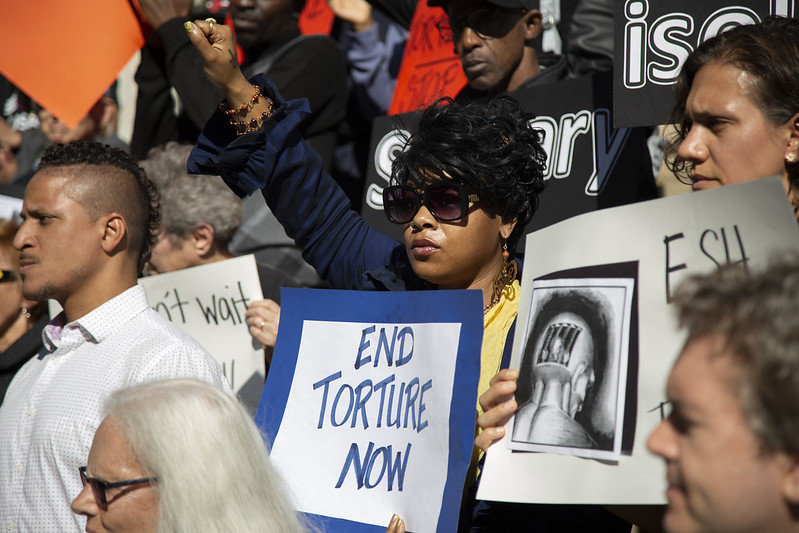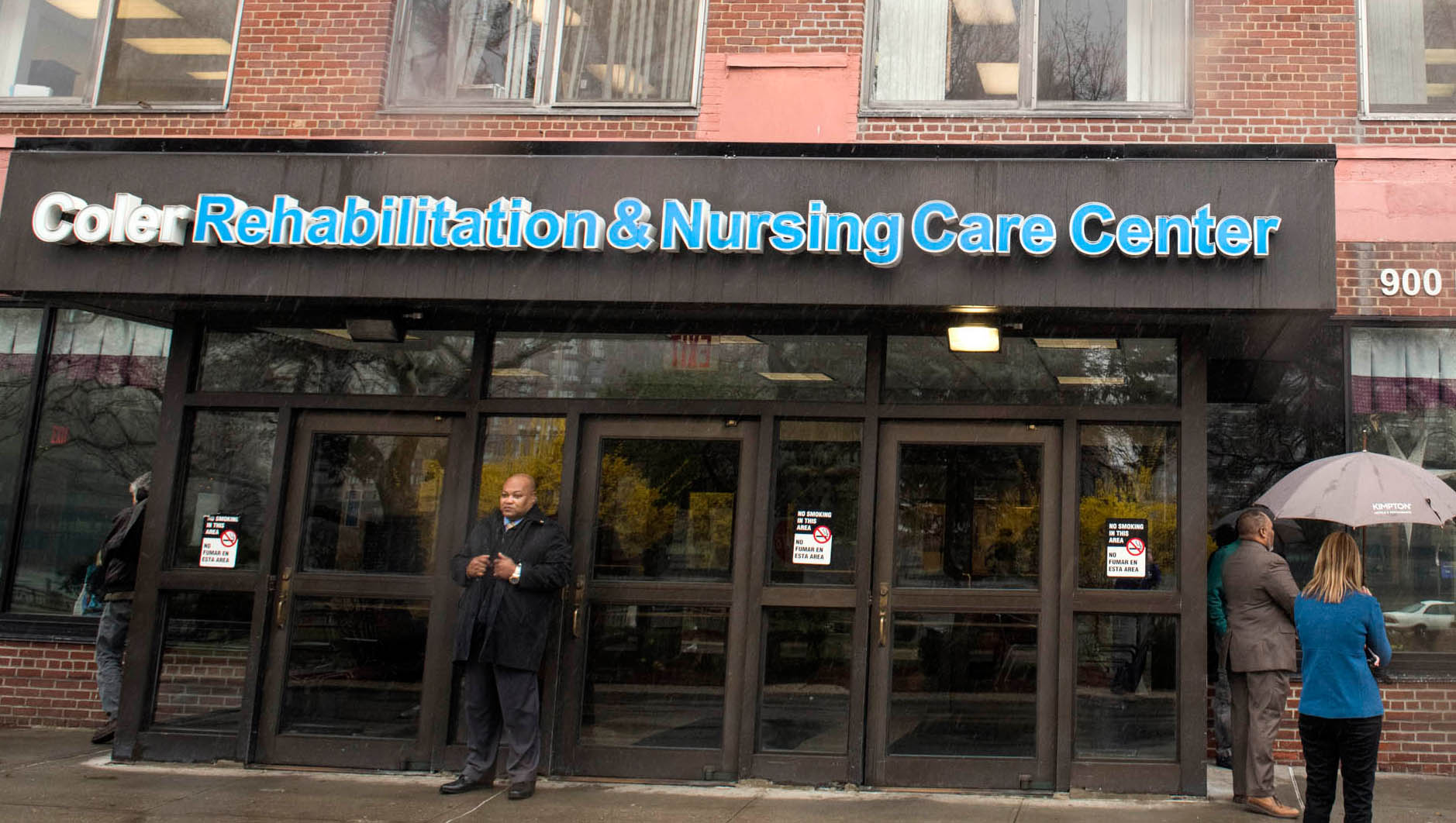New York Must Address Racist State Violence from Policing to Jails and Prisons

A rally to end solitary confinement (photo: John McCarten/City Council)
On April 14, 60-year-old Leonard Carter died of COVID-19 while incarcerated at Queensboro Correctional Facility. He had already been granted parole and, after a quarter century behind bars, was just weeks from his release date. He was the brother of one of us writing to demand change here today.
While public attention has focused on the brutality of police in Black communities, that is just the front end of a system designed to control, dehumanize, and brutalize Black people. Calls to defund the police and dismantle systems of white supremacy must be expanded to include the institutions whose role is to criminalize, cage, and brutalize Black bodies, from prosecutors to the Department of Corrections and Community Supervision.
As a formerly incarcerated Black activist, a Black New York State Assemblymember representing Brownsville, Brooklyn, and the sister of a Black man who died of COVID-19 behind bars, we know that racist state violence pervades not just policing, but courthouses, jails, and prisons, too.
The anti-Black violence of our criminal legal system is not located in some far away city or state. Here in New York, Black people are more likely to have money bail set and be jailed before trial. We are more likely to be coerced into plea deals that include jail time. We are more likely to be incarcerated on a technical violation of parole or probation. We are more likely to be subject to the torture of solitary confinement. While only 18% of New Yorkers are Black, we represent 48% of people in state prison and 57% of people in solitary. During the height of the COVID-19 pandemic, 80% of people who died of coronavirus behind bars were people of color.
Earlier this month, New York’s Legislature repealed 50-a, a state law that had been used to shield police misconduct records from public view. This was a culmination of a years-long campaign led by families of people killed by the NYPD and a critical step towards greater police accountability and transparency.
But it was simply a first step. To achieve justice for Black people, we must fundamentally shift resources away from policing and systems of criminalization and towards the community investments that truly keep us safe: education, affordable housing, quality health-care, youth programs. At the same time, we must center the voices of marginalized Black people: Black undocumented people, Black incarcerated people, Black trans people.
The Legislature must not lose sight of the devastation wrought on Black New Yorkers by the full system of mass criminalization and state violence. In our fight to defend Black lives, we must repeal the “walking while trans ban” to protect Black and brown trans women from harassment by the police. We must pass the Protect Our Courts Act -- passed by the Assembly on Monday and awaiting Senate action -- to codify a recent court ruling protecting Black and brown immigrants from the terror of ICE arrests in and around courthouses. We must pass the HALT Solitary Confinement Act to end this torture behind bars. And we must pass Elder Parole and Fair and Timely Parole to end death-by-incarceration of Black elders.
While we mourn with those who knew and loved George Floyd, Breonna Taylor, Tony McDade, and Ahmaud Arbery, we also mourn the death of Cynthia’s brother Leonard Carter. We mourn the deaths of Kalief Browder, Layleen Polanco, Lulu Benson-Seay, Benjamin Smalls, Dante Taylor, Valerie Gaiter, Samuel Harrell, and all those who have died at the hands of racist state violence, often behind jail or prison walls. In their names, we commit to the struggle to dismantle the carceral state and build the power of our communities. We call on the New York Legislature to do the same.
***
Assemblymember Latrice Walker represents Brooklyn’s 55th District. Marvin Mayfield is a New York State Organizer at Center for Community Alternatives. Cynthia Carter-Young is a lifelong Brooklynite and the sister of Leonard Carter.
***
Have an op-ed idea or submission for Gotham Gazette? Email This email address is being protected from spambots. You need JavaScript enabled to view it.
Returning Power to the People by Rebalancing the State Budget Process

Gov. Cuomo presents a budget plan (photo: Darren McGee/Governor's Office)
The job of state legislators is to craft laws that protect New Yorkers and advance equal opportunity and justice. A significant part of that job is shaping our state budget, which funds our schools, our health care, our transportation systems, and a long list of vital other public services. During a global pandemic, this already crucial responsibility has reached a new level of importance. But, over the years, in the strange world of Albany, the role and power of the New York Legislature during the budget process has been stripped away.
It’s time to re-balance the power between the Legislative and Executive branches of state government, and take back the people’s seat at the table, by amending the State Constitution and passing the Budget Equity Act.
Government works best when the checks and balances inherent to our democratic process remain unobstructed, we honor the bulwarks of our democracy, and empower co-equal branches of government. This is true at the federal level, and also at the state and local levels.
Our democracy was built on the idea that no person or branch of government should accrue too much power. But this democratic principle is not upheld in New York State. This is because a long line of governors have increasingly used a state constitutional provision from 1927 to minimize the role of legislators and grow their own centralized power in the budget process. In addition to seizing dominant control over how to fund or cut critical services, they have used their power to further their own policy agendas by putting consequential legislation directly into the state budget.
When the executive branch puts policy directly into the budget, the language cannot be amended by the Legislature. Unless the governor chooses to change their own budget bill, the Legislature’s only option is to go along with what the governor demands or reject the budget entirely. There is no debate, no room for change, no room for anyone else’s opinions – most importantly the public’s. And for years now, governors have been pushing the bounds of their executive power far beyond the purely budgetary matters for which it was intended.
This end-run around the legislative process has been used to create laws without allowing for the open and public process that new policies deserve. For example, just this year, policies like whether nursing homes should be shielded from liability if they are negligent in their treatment of COVID-19 patients (which we both opposed) and expanding New York’s prevailing wage laws to include publicly-subsidized construction (which we both supported), have become law via this undemocratic process. There was no opportunity for debate or modification without rejecting the entire state budget. A difficult vote we were forced to take.
Surely our system can’t be so far from what our founders spelled out. But unfortunately, this is what our state constitution says, as interpreted by the courts.
As legislators, we are elected to represent our constituents, but their voices are silenced when we are not allowed to fully exercise our rightful role in making laws. Our founders recognized that the process of vigorous debate and discussion, with the full engagement of legislators from very disparate communities to be able to perfect the budget into the best possible piece of legislation, was the best way to ensure that all voices and viewpoints are considered before an idea becomes law.
No matter how you feel about nursing home liability or prevailing wage policies, we can all agree that they deserve as full a public airing, consideration, and opportunity for amendment as other laws. Indeed, preserving each legislator’s role in addressing bills like those is not only critical for ensuring the best process for public involvement, it is also vital for the electoral accountability on which our democracy is founded.
Our proposed amendment to the New York State Constitution would correct this imbalance of power. It simply requires that the Governor clearly indicate any non-budgetary policy changes contained within their proposed budget, and ensure that the Legislature has the authority to amend those policy changes through the normal amendment process.
We live in a time when more and more of the residents we serve feel disenfranchised by their government and worry about the concentration of power in the hands of fewer and fewer individuals. By passing the Budget Equity Act – which then would be voted on in a statewide referendum – we can give the people the more representative government they are rightfully owed.
***
State Senator Alessandra Biaggi represents parts of the Bronx and Westchester. Assemblymember Richard Gottfried represents parts of Manhattan. On Twitter @SenatorBiaggi & @DickGottfried.
***
Have an op-ed idea or submission for Gotham Gazette? Email This email address is being protected from spambots. You need JavaScript enabled to view it.
The Pandemic Further Exposed Nursing Homes; New York Needs to Invest in Better Options for Senior and Disabled Populations

The coronavirus crisis put a spotlight on nursing homes (photo: Ed Reed/mayor's office)
COVID-19 has forced us to face a long-known, but ignored, truth: nursing homes are not desirable places to age. And the racial disparities in quality of health care at these facilities was only exacerbated by the pandemic, as we saw higher COVID-19 death rates in facilities with more people of color.
Just within the past month, 743 people have died in New York State of COVID, and 225 of those people were in nursing homes – a staggering 30% of total deaths. The total doesn’t even count people who were shifted from a nursing home to a hospital then died.
Governor Cuomo recently doubled down on his position that being at a nursing home was safer than having a personal aide caring for you at home. But senior and disabled residents who rely on consumer directed personal assistance (CDPA), a program that lets them hire their own caregivers so they can continue to live independently, would disagree.
A survey of consumers using CDPA, conducted by Consumer Directed Personal Assistance Association of New York State (CDPAANYS) during the COVID-19 pandemic, showed that chief among the concerns expressed by consumers statewide was a fear of being institutionalized.
Without CDPA contributing to shrinking nursing home populations, the tragedy that has played out over the last several months and continues today would have been even worse. Despite this, over $200 million in state budget cuts to CDPA over two years, including a $45 million cut at the height of the outbreak in April to the wages of these personal assistants providing at-home care, have threatened the ability of the program to be effective at a time when it’s needed most.
This $45 million represents a 25% cut to wages and benefits for frontline workers, decided on by the governor’s Medicaid Redesign Team earlier this year, despite a study showing low wages were one of the chief obstacles to both recruitment and retention of homecare workers.
As our population has aged, CDPA has played an increased role in the long-term care system for a host of reasons. Nursing homes have never been desirable, and the Americans with Disabilities Act (ADA) has forced states to utilize more community-based options. Accessibility to CDPA has been a key factor in individuals who need home care being able to remain independent and stay within their communities and homes, and during the COVID crisis it may very well have saved some of their lives.
CDPA has grown rapidly as a more popular alternative to traditional forms of home care in which an agency sends workers to your home based on availability. CDPA is more flexible, letting people set their own care schedules, and because the program allows people to recruit and hire their own workers, it’s also proven exceptional at narrowing the language and cultural gaps that plague our health-care system.
Because those caregivers hired can also be friends or family, it has created options for those who do not have the luxury of being an “informal,” or unpaid, support for their family due to their economic reality. In the communities hit hardest by COVID-19 and broader health disparities, informal care often means sacrificing a paycheck.
Over the past five years the number of people using CDPA has more than doubled to about 80,000. Over the same five-year period, New York closed over 1,800 nursing home beds.
Additionally, as the epicenter of the national shortage in home care workers, New York does not have enough home care workers to handle the increased demands of our rapidly aging population, increasingly composed of immigrants and people of color living in poverty.
Regardless, Governor Cuomo and the Legislature cut funding for CDPA by that $200-plus million in just the past two years alone.
With so many nursing home deaths within our state, New Yorkers will be further spurred to look for alternatives to care for their senior family members who need it. Unfortunately, our state's response, the past few years, has been to cut long-term care services for those most in need. This position was wrong before the crisis and is still wrong for our seniors and disabled populations who wish to stay in their communities. We should instead be investing more into effective, community-based health services like CDPA to address health disparities and improve outcomes.
Our leaders must resist harmful cuts and instead enact popular proposals like raising taxes on the wealthy to bring in revenue that can be used for essential services.
CDPA’s growth has allowed the state to reduce the already devastating impact that health disparities and confinement to nursing homes are producing. That growth, while it may not have been planned, is not unreasonable given the relative increase of the aging population, the closure of almost 2,000 nursing home beds, and the shortages of traditional home care staff. For all its horrors, COVID-19 presents us an opportunity to right historical wrongs. Shame on us if we choose not to take it.
***
Bryan O’Malley is Executive Director of the Consumer Directed Personal Assistance Association of New York State.
***
Have an op-ed idea or submission for Gotham Gazette? Email This email address is being protected from spambots. You need JavaScript enabled to view it.




